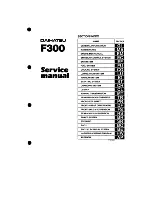
2. Slow down if road has standing water or puddles.
3. Replace tires when tread wear indicators first become
visible.
4. Keep tires properly inflated.
5. Maintain enough distance between your vehicle and
the vehicle in front of you to avoid a collision in a sudden
stop.
DRIVING THROUGH WATER
Driving through water more than a few inches deep will
require extra caution to ensure safety and prevent dam-
age to your vehicle.
Flowing/Rising Water
WARNING!
Do not drive on or cross a road or a path where water
is flowing and/or rising (as in storm run-off). Flow-
ing water can wear away the road or path’s surface
and cause your vehicle to sink into deeper water.
Furthermore, flowing and/or rising water can carry
your vehicle away swiftly. Failure to follow this
warning may result in injuries that are serious or
fatal to you, your passengers, and others around you.
Shallow Standing Water
Although your vehicle is capable of driving through
shallow standing water, consider the following before
doing so:
248
STARTING AND OPERATING
Summary of Contents for Caliber
Page 2: ......
Page 5: ...INTRODUCTION 5 1 ...
Page 8: ......
Page 70: ......
Page 101: ...UNDERSTANDING THE FEATURES OF YOUR VEHICLE 101 3 ...
Page 102: ...102 UNDERSTANDING THE FEATURES OF YOUR VEHICLE ...
Page 103: ...UNDERSTANDING THE FEATURES OF YOUR VEHICLE 103 3 ...
Page 146: ...Removing Flashlight Three Press Switch 146 UNDERSTANDING THE FEATURES OF YOUR VEHICLE ...
Page 159: ...INSTRUMENT PANEL FEATURES UNDERSTANDING YOUR INSTRUMENT PANEL 159 4 ...
Page 160: ...INSTRUMENT CLUSTER BASE 160 UNDERSTANDING YOUR INSTRUMENT PANEL ...
Page 161: ...INSTRUMENT CLUSTER PREMIUM UNDERSTANDING YOUR INSTRUMENT PANEL 161 4 ...
Page 222: ...Operating Tips 222 UNDERSTANDING YOUR INSTRUMENT PANEL ...
Page 257: ...STARTING AND OPERATING 257 5 ...
Page 310: ......
Page 314: ...ENGINE COMPARTMENT GASOLINE ENGINES 314 MAINTAINING YOUR VEHICLE ...
Page 368: ......
Page 378: ......
Page 379: ...INDEX 10 ...
















































